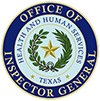OIG educates home health care providers about visit documentation
The OIG is committed to making sure Texas Medicaid clients receive the quality health care they deserve. To ensure services are being provided appropriately, the agency conducts investigations and reviews of Medicaid service delivery. Often that work involves personal care attendant services and the Electronic Visit Verification (EVV) system.
In 2019, Texas Health and Human Services (HHS) and managed care organizations (MCOs) began implementing changes to the Texas Medicaid EVV system. Some of the new policies and procedures include billing and coding fixes to make certain clients receive services for which Medicaid is billed.
Through the course of its work, the OIG has observed common billing errors repeated across providers. Referrals from MCOs and to the OIG Fraud Hotline include the following common complaints:
- Attendants not showing up but still clocking in as if they are providing services.
- The attendant and client committed fraud together by falsifying documentation of visits through the EVV and sharing the payments.
- Overlapping services where the attendant works for two different agencies and clocks in for multiple clients at the same time.
- Attendant clocking in while the client is in an inpatient facility or incarcerated.
- Attendants continuing to clock in after a client’s death.
- The agency not performing onsite visits enough to verify that client services are being provided.
- The agency not replacing the attendants timely enough or checking in often enough with the clients.
Employees are reminded to access the EVV system themselves – not have their employer do it for them – and use their own login credentials. Do not share credentials with someone else. Visits manually entered by the employer instead of the employee negatively impact the employer’s EVV usage score.
Misusing the system
The OIG resolved a variety of cases in the fiscal year 2021 related to home health agencies and EVV systems. One case referred to the agency from the Texas Office of Attorney General – Medicaid Fraud Control Unit involved a provider in Houston who employed a personal care attendant that misused the EVV system and logged hours that they could not have worked. The provider fully cooperated and responded by identifying all hours that could be related to the personal care attendant’s acts. The provider offered to pay $18,609 to resolve the identified hours.
In San Antonio, a home health care provider employed a personal care attendant who, by their own admission, did not provide any attendant services to a patient but still submitted timesheets and receive compensation. The provider worked collaboratively with the OIG and is working to improve its policy and practices relating to proper and routine home visits and better communication with clients. To resolve the case, the provider agreed to a settlement of $76,697.
The OIG continues to investigate attendant care cases and recommend administrative action or sanction, including education letters, recoupment, penalties, termination of enrollment, and exclusion from Texas Medicaid, based on findings.
Resources
HHS is in the process of proposing rules describing the procedures an MCO must follow to recoup an overpayment made to a health care provider due to missing EVV information and reviewing due process procedures an MCO must follow to recoup funds related to fraud or abuse.
The OIG has fraud prevention reminders for providers and attendants in its website’s resources section. Visit the HHS website for an EVV overview (https://tinyurl.com/whatisevv), the EVV visit maintenance policy (https://tinyurl.com/evvvisit) and the EVV verification methods policy (https://tinyurl.com/evvevm).
Report wrongdoing
If you see fraud, waste or abuse taking place, contact your managed care organization, call the OIG Fraud Hotline at 800-436-6184 or use the fraud reporting form on the OIG website.

